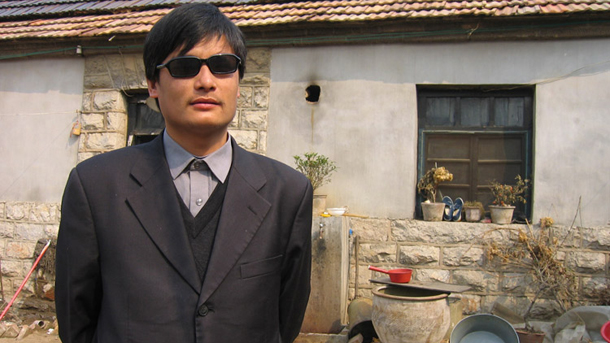WASHINGTON D.C.—For the second time in less than two weeks, Chinese dissident Chen Guangcheng has spoken by phone to a US congressional hearing and alleged persecution of his relatives.
Chen complained on Tuesday that his elder brother and nephew had both been beaten by Chinese authorities since Chen fled house arrest in late April.
Chen said a charge of homicide brought against his nephew was “trumped up” as he was acting in self-defense after being subjected to a three-hour beating that left him bleeding.
“This is a pattern,” Chen said. “This is not the first time it happened against my family.”
Rights activist Bob Fu, who translated Chen’s comments, earlier testified that Chen’s nephew, Chen Kegui, using a kitchen knife, had injured several people who had burst into his home without warrants.
Chen is awaiting Chinese permission to travel to study in the US.
State Department spokeswoman Victoria Nuland said on Tuesday that US visas for Chen, his wife and children are ready for them to travel to America once Beijing gives the green light. She said the visa processing was completed more than a week ago.
Chen, a blind legal activist, has been at a Beijing hospital after his flight to the US Embassy triggered intense US-China negotiations on his fate.
Chen has gained recognition for crusading for the disabled and fighting against forced abortions in his rural community. But he angered local officials and was convicted in 2006 on what his supporters say were fabricated charges. After serving four years in prison, he then faced an abusive and illegal house arrest.
“What I have done is out of my conscience and conviction,” he said on Tuesday. “We cannot be silent when we see and face these kinds of evils.”
His call to the House Foreign Affairs subcommittee on human rights from the Beijing hospital was his second in 12 days.
Both hearings focused on the fate of Chen and his family, chaired by Republican Rep. Chris Smith, a fierce critic of China and its one-child policy that aims at restricting the growth of the world’s largest population.
Smith and the witnesses who were testifying gathered on the dais and huddled around the microphone to listen to Chen’s crackling voice for about 25 minutes and pay tributes to him.
He complained that local authorities have refused to allow a lawyer commissioned by his nephew’s wife to defend the nephew, unless the wife appears in person, which Chen claimed was a tactic designed to get the wife to surrender to authorities. Chen contended the same tactic had been used against him when he faced trial in 2006.
He described it as a violation of the Chinese Constitution and criminal law.
Smith, who is critical of the Obama administration’s handling of Chen’s case, earlier described the dissident’s current status at the Beijing hospital as “de facto house arrest” because of restrictions on his movements and visitors.
US officials have said diplomats can meet with Chen’s wife, and speak to Chen by telephone, but have not met with him in person since May 4. Nuland said US officials have been in contact with Chen two or three times a day, and Chen confirmed the embassy has been communicating with him every day.
It’s unclear when China might authorize Chen’s departure from the country.
In the meantime, Chen said that his two children were happy in Beijing as they were able now to play outside. Chen said that simple freedom shows how terrible their circumstances had been in their home village in Shandong Province.
















